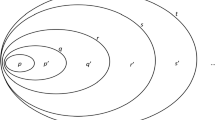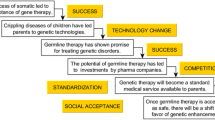Abstract
Attempts to evaluate a belief or argument on the basis of its cause or origin are usually condemned as committing the genetic fallacy. However, I sketch a number of cases in which causal or historical factors are logically relevant to evaluating a belief, including an interesting abductive form that reasons from the best explanation for the existence of a belief to its likely truth. Such arguments are also susceptible to refutation by genetic reasoning that may come very close to the standard examples given of supposedly fallacious genetic reasoning.
Similar content being viewed by others
REFERENCES
Brinton, Alan: 1985, ‘A Rhetorical View of the Ad Hominem’, Australasian Journal of Philosophy 63, 50–63.
Churchill, Robert Paul: 1986, Becoming Logical: An Introduction to Logic, St. Martin's Press, New York.
Cohen, Morris and Ernest Nagel: 1934, An Introduction to Logic and Scientific Method, Harcourt, Brace & World, New York.
Copi, Irving: 1953, Introduction to Logic, Macmillan, New York.
Crouch, Margaret: 1991, ‘Feminist Philosophy and the Genetic Fallacy’, Hypatia 6, 104–117.
Crouch, Margaret: 1993, ‘A “Limited” Defense of the Genetic Fallacy’, Metaphilosophy 24, 227–240.
Engel, S. Morris: 1986, With Good Reason: An Introduction to Informal Fallacies, 3rd ed., St. Martin's Press, New York.
Feuer, Lewis S.: 1983: ‘The Genetic Fallacy Re-examined’, in Paul Kurtz (ed.), Sidney Hook: Philosopher of Democracy and Humanism, Prometheus Books, Buffalo.
Freeman, David Hugh: 1967, Logic: The Art of Reasoning, David McKay Co., New York.
Fumerton, Richard: 1980, ‘Induction and Reasoning to the Best Explanation’, Philosophy of Science 47, 589–600.
Goudge, T. A.: 1961, ‘The Genetic Fallacy’, Synthese 13, 41–48.
Handy, Rollo: 1959, ‘The Genetic Fallacy and Naturalistic Ethics’, Inquiry 2, 25–33.
Hanson, Norwood Russell: 1967, ‘The Genetic Fallacy Revisited’, American Philosophical Quarterly 4, 101–113.
Harman, Gilbert: 1965, ‘The Inference to the Best Explanation’, Philosophical Review 74, 88–95.
Harman, Gilbert: 1968, ‘Enumerative Induction as Inference to the Best Explanation’, Journal of Philosophy 65, 529–533.
Hinman, Lawrence M.: 1982, ‘The Case for Ad Hominem Arguments’, Australasian Journal of Philosophy 60, 338–345.
Hintikka, Jaakko: 1998, ‘What Is Abduction? The Fundamental Problem of Contemporary Epistemology’, Transactions of the Charles S. Peirce Society 34, 503–533.
Huppé, Bernard F. and Jack Kaminsky: 1956, Logic and Language, A. A. Knopf, New York.
Kim, Chin-Tai: 1990, ‘A Critique of Genealogies’, Metaphilosophy 21, 391–404.
Lavine, T. Z.: 1962, ‘Reflections on the Genetic Fallacy’, Social Research 29, 321–336.
Minot, Walter: 1981, ‘A Rhetorical View of Fallacies: Ad Hominem and Ad Populum’, Rhetoric Society Quarterly 11, 222–235.
Niiniluota, Ilkka: 1999, ‘Defending Abduction’, Philosophy of Science 66 Supplement, 436–451.
Pashman, Jon: 1970, ‘Is the Genetic Fallacy A Fallacy?’, Southern Journal of Philosophy 8, 57–62.
Peirce, Charles S.: 1982, ‘Harvard Lectures 1865’, in M. Fisch et al. (eds.), Writings of Charles S. Peirce: A Chronological Edition, vol. 1, Indiana University Press, Bloomington.
Salmon, Wesley: 1970, Logic, Prentice Hall, Englewood Cliffs, NJ.
Werkmeister, W.H.: 1948, An Introduction to Critical Thinking, Johnson Publishing, Lincoln, Nebraska.
Wheelwright, Philip: 1962, Valid Thinking: An Introduction to Logic, Odyssey Press, New York.
Yanal, Robert: 1988, Basic Logic, West Publishing, New York.
Author information
Authors and Affiliations
Rights and permissions
About this article
Cite this article
Klement, K.C. When Is Genetic Reasoning Not Fallacious?. Argumentation 16, 383–400 (2002). https://doi.org/10.1023/A:1021132731699
Issue Date:
DOI: https://doi.org/10.1023/A:1021132731699




